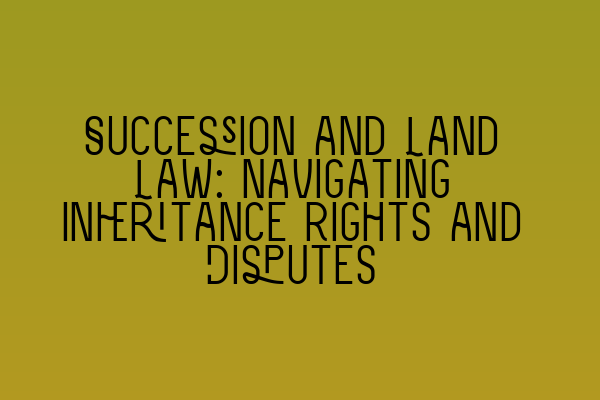Succession and Land Law: Navigating Inheritance Rights and Disputes
Welcome to the SQE Property Law & Land Law blog! In this article, we will delve into the fascinating world of succession and land law, exploring the intricacies of inheritance rights and the potential disputes that can arise. As a solicitor, it is crucial to have a strong understanding of this area of law to effectively advise clients and navigate the complex legal landscape.
Before we dive into the details, it’s important to note that property law and land law are distinct but closely related areas. Property law deals with the legal rights and obligations associated with both real and personal property, while land law focuses specifically on the rights and interests in land. Inheritance rights and succession fall within the realm of both property law and land law.
Understanding Inheritance Rights
Inheritance rights are the legal rights and entitlements of individuals to inherit property from a deceased person. These rights are governed by the laws of succession. When a person passes away, their property, including land, will need to be distributed to their heirs according to the applicable laws.
The specific rules governing inheritance rights vary depending on many factors, including the jurisdiction, the presence of a valid will, the relationship between the deceased and the potential heirs, and any specific provisions outlined in the will. Understanding these laws and rules is essential to ensure a fair and legally compliant distribution of assets.
It is crucial for solicitors practicing in the field of property law and land law to familiarize themselves with the relevant legislation and case law surrounding inheritance rights. By doing so, they can provide expert advice to their clients and help them navigate the complexities of succession.
Common Inheritance Disputes
Unfortunately, inheritance disputes are not uncommon, and they can be emotionally and financially draining for all parties involved. These disputes often arise when there is a lack of clarity or disagreement regarding the deceased’s intentions, the validity of the will, or the distribution of assets.
Some common inheritance disputes include:
- Contesting the validity of a will: When there are doubts about the authenticity or legality of a will, interested parties may initiate legal proceedings to challenge its validity.
- Disputes over testamentary capacity: In some cases, there may be questions about the mental capacity of the deceased at the time of making the will. This can lead to disputes over the validity of the document.
- Failure to provide adequately for dependents: In certain jurisdictions, legislation may require that the deceased adequately provide for their dependents in their will. Disputes can arise when there are claims that the will does not adequately fulfill this obligation.
- Undue influence or coercion: If it can be proven that the deceased was unduly influenced or coerced into making changes to their will, interested parties may contest its validity.
- Disputes over the interpretation of the will: Even when a will is valid, disagreements can arise when interpreting its provisions. This can lead to disputes over the distribution of assets.
As a solicitor, it is crucial to be equipped with a deep understanding of inheritance law and the ability to navigate these sensitive disputes. By providing sound legal advice and representation, you can help your clients protect their rights and maximize their chances of a favorable outcome.
Navigating Succession and Land Law as an SQE Candidate
If you are an aspiring solicitor preparing for the Solicitors Qualifying Examination (SQE), it is essential to develop a strong understanding of succession and land law. The SQE tests candidates’ functioning legal knowledge (FLK) across various areas of law, including property law and land law.
To effectively prepare for the SQE, consider integrating the following resources into your study plan:
- 48. Unlocking Legal Research Skills for SQE Success: This article provides valuable insights into honing your legal research skills, which will be crucial in navigating complex areas of law like succession and land law.
- 53. Functioning Legal Knowledge (FLK): Core Concepts for SQE Candidates: Familiarize yourself with the core concepts tested in the SQE, including those relevant to property law and land law.
- 44. Essential SQE Textbooks: Building a Solid Foundation for Exam Prep: Explore recommended textbooks to deepen your understanding of property law, land law, and inheritance rights.
- 43. Unraveling the SQE Stages: A Roadmap to Success: Get a clear overview of the different stages of the SQE and tailor your study plan accordingly.
- 41. Test Centers for SQE: Convenient Locations for the Exam: Explore the available test centers for the SQE, ensuring that you select a convenient location for your examination.
By incorporating these resources into your study routine, you will be well-equipped to tackle the property law and land law topics tested in the SQE and approach any inheritance rights-related questions with confidence.
Conclusion
Succession and land law play a vital role in ensuring the fair distribution of assets and protecting the rights of heirs. As a solicitor, it is crucial to have a solid understanding of these areas of law to effectively advise clients and navigate inheritance disputes.
Whether you are a seasoned solicitor or an aspiring SQE candidate, continuous learning and staying updated on the latest legal developments are essential. Explore the recommended resources provided in this article to enhance your knowledge and excel in your legal career.
For more information on property law, land law, and other essential topics for SQE success, be sure to explore our comprehensive range of articles and resources on the SQE Property Law & Land Law website.
